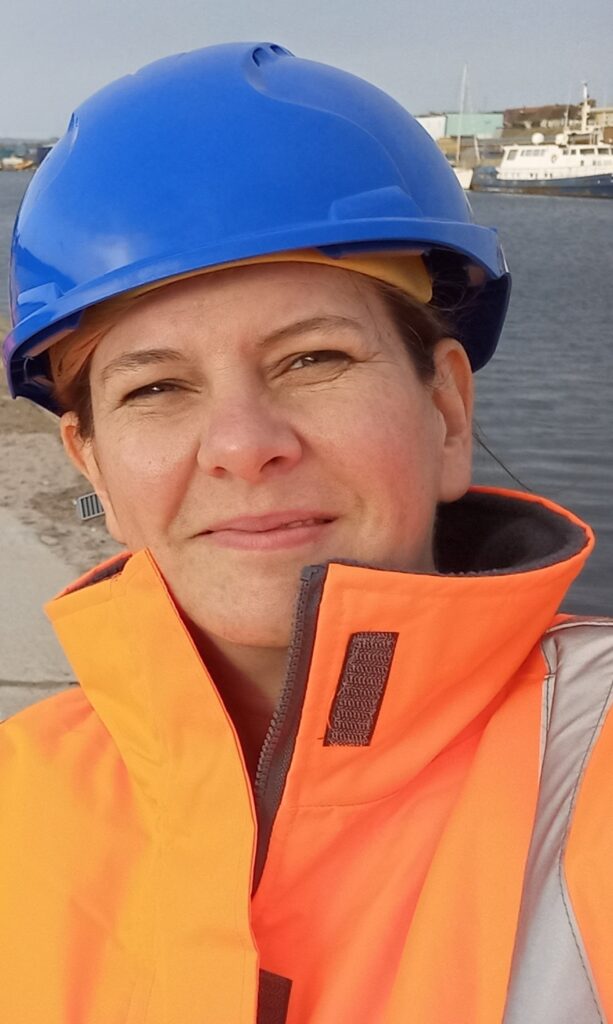Spotlight Interview: Chief Executive at Port Skills Safety
We’re excited to share the second instalment of our spotlight interviews with industry leaders. This time, we feature Debbie Cavaldoro, the Chief Executive at Port Skills Safety. She has also recently been appointed as the Chair of the Board of Trustees at NUJ Extra, solidifying her status as a highly regarded expert in her field. Our goal for this interview is to explore Debbie’s career journey, from her student days to her current role as a respected leader in the industry. We invite you to continue reading…
When you left school did you have any clear idea about the kind of work you wanted to do?
 I suspect like most people I had no idea what I wanted to do when I left school. I knew that I didn’t want to go to university and couldn’t see the point of A levels, except to go to uni. I don’t know why as I wasn’t the worst or the best academically. I think I was so average in most respects that I often wondered how teachers managed to find anything to say about me.
I suspect like most people I had no idea what I wanted to do when I left school. I knew that I didn’t want to go to university and couldn’t see the point of A levels, except to go to uni. I don’t know why as I wasn’t the worst or the best academically. I think I was so average in most respects that I often wondered how teachers managed to find anything to say about me.
Career advice in my school was, and I suspect still is, inadequate to prepare children for 40-plus years of working. So much focus is put on exams but with very little explanation of why. It is also very difficult for a 16-year-old to comprehend what 40 years of work looks like!
I also knew I didn’t want to be a secretary or have a dead-end job (I knew a lot about what I didn’t want) and therefore figured I would need to have some sort of further training. I ended up on a Youth Training Scheme (the apprenticeship scheme of the day), working four days a week in the marketing department of a computer firm. I stayed there for three years, gaining qualifications in business studies. The money was awful, but the life experiences were priceless.
Tell us about school leaver Debbie?
I can imagine I was probably quite annoying at that age – I didn’t want to do what everyone else did. Going out to work was the best thing for me. I spent a lot of time with people five or ten years older than me and working in marketing meant I ran a lot of events which forced me to mature and grow into myself. I remember one summer when my friends had come back from their first year at uni telling me about how they went out every Monday night as it was ‘pound a pint night’. In return, I told them about my work which often included free lunches/dinners, free drinks and free taxis to go home (being the youngest and poorest, I was lucky for the support and freebies I received from colleagues!).
What are your earliest memories of working within the Maritime industry?
 I spent several years in various communications roles covering private, public and third-sector organisations, but my first job in the maritime sector was when I joined the seafarers’ trade union Nautilus International. I had been in predominately press officer roles before then and this was my first job as a journalist for the union’s monthly newspaper.
I spent several years in various communications roles covering private, public and third-sector organisations, but my first job in the maritime sector was when I joined the seafarers’ trade union Nautilus International. I had been in predominately press officer roles before then and this was my first job as a journalist for the union’s monthly newspaper.
My first memory is from when I attended a maritime medical conference in my first week where they brought together all the doctors who examine seafarers for their ENG1 medical. I was due to write a 2,000-word feature (having done nothing more than 250-word press releases up until then). I knew nothing about medicine, nothing about seafarers and didn’t understand most of the words being said. I felt like I was listening to a foreign language!
However, I picked up the lingo and the many many acronyms quite quickly. Plus it’s hard not to fall in love with a sector that has so many passionate people working within it, who love the maritime industry and equally love to talk to you about it.
How have you found working for such varied industries during your career, such as Maritime/Port, Leisure, Politics, Media and more?
It took me a while to realise I had a career and wasn’t just lurching from one job to another. Although the sectors have been different, I have always worked in some sort of communications role – something that I’m sure would have amazed my English teacher at school.
Each sector has been different and each one has had its highs and lows but I can honestly say no sector has had people as passionate about what they do as maritime does, although don’t say that to the football team I worked for!
A lot of the sectors have had some large personalities, but I have found that the bigger and better they are, the more humble they are.
You are currently working as Chief Executive at Port Skills and Safety and have over 12 years of Maritime experience in Senior leadership positions. Take us back to when you first started down this career path, what challenges did you face, and what achievements have you made along the way?
I’m not sure I ever made a conscious decision about what my ‘career’ would be, I think I just always want to be learning, so once I have learnt how to do a job, I naturally start looking at the next challenge. A manager once wrote in my annual review;
‘it’s very hard to manage Debbie as she is very nosy and wants to be involved in everything’
There have been challenges along the way, but I think you have to take the rough with the smooth. Your whole life of work spans many years so there’s lots of time to get things wrong, change your mind, learn new things and take completely new directions. I try to base my management style now, on every manager I’ve ever had, try not to do what the bad ones did and copy the ones who were great.
One of my biggest challenges was the chip on my shoulder about not going to university. The number of times through my career that people have asked what university I went to, who have then frowned in confusion when I said I didn’t go. Or the number of jobs I’ve not been able to apply for simply because they blindly state ‘must have a degree’. I finally exercised this demon by studying for a master’s – although studying at the same time as getting a job as a chief executive wasn’t ideal.
I think organisations need to consider why they are asking for degrees in their positions. I believe the three years I spent working and studying in my first job were at least as valuable, if not more, than having gone to university and once you have ten years of work experience, I don’t believe it makes any difference.
 What do you believe are the key factors in gaining and maintaining awareness around the importance of Health and Safety on port sites?
What do you believe are the key factors in gaining and maintaining awareness around the importance of Health and Safety on port sites?
I think sometimes in Health and Safety, sayings can become mantras and lose their meaning, ‘Safety First’, ‘Going home safe at the end of every day’, etc. Things that all of us want, but when we say them too much, we lose what they mean. We need to remind ourselves and each other what we mean when we say everyone going home safely, it means challenging your peers when they slacken on rules. It means challenging managers when profit is put before safe practice, it means challenging the industry when root causes are not identified and shared. These are not easy things to do but can be the difference between life and death in safety-critical industries.
What key projects or areas are you currently working on?
This year Port Skills and Safety launched a new strategic place with Key Performance Indicators for the four main areas of our business, which will shape our work for the next five years.
Improve UK Port Safety Guidance
Bring all existing Safety in Port (SiP) documents up to best practice industry standards by 2028. At least four SiPs will be reviewed per year, with existing SiPs updated by 2028.
Increase awareness of SiPs guidance by increasing website downloads of guidance by 35 per cent from 2023 levels by 2028.
Increase UK Port Skills Engagement
Deliver a 25 per cent increase in participation from members on skills projects, including the Port Skills Group, from 2023 levels by 2028. Fulfil the objectives laid out in the five-year skills strategy.
Research and deliver a suite of information detailing port-related jobs, career opportunities, training requirements, qualification routes and competencies by 2028.
Improve UK Port Safety Statistics
Zero incidences of fatal industry accidents among members, where SiPs guidance is adhered to.
Increase the number of full port members contributing to the incident safety dashboard to a minimum of 75 per cent for full members by 2028.
Improve Membership Value Proposition
Facilitate full communications with, and between members, by sharing all alerts and bulletins within three working days, holding one all-member conference per year, and at least eight safety or skills meetings per year.
Increase membership by 15 per cent of income from 2022 within five years and introduce at least four new tools to help members continuously improve their safety statistics.
Where do you see the immediate challenges, and what are the longer-term opportunities in the future of port safety and upskilling?
 One of the pressing challenges with regard to training and skills in the sector is the lack of solid information about the job roles and skill sets that exist in the ports sector. We talk a lot about skills shortages but without solid data, we cannot state where these shortages are or look to address them. This is why PSS has a project running with the Maritime Skills Commission to gather more data on port jobs. This will be launched at London International Shipping Week in September and we hope as many port sector organisations as possible take part. With this data, we can then see where the gaps are likely to be for the future but also we can provide better resources to attract people into the sector. Ports offer a lot of opportunities, both on the quayside, but also more traditional office jobs and we need to be able to tell young people especially, about them so they consider ports as a career.
One of the pressing challenges with regard to training and skills in the sector is the lack of solid information about the job roles and skill sets that exist in the ports sector. We talk a lot about skills shortages but without solid data, we cannot state where these shortages are or look to address them. This is why PSS has a project running with the Maritime Skills Commission to gather more data on port jobs. This will be launched at London International Shipping Week in September and we hope as many port sector organisations as possible take part. With this data, we can then see where the gaps are likely to be for the future but also we can provide better resources to attract people into the sector. Ports offer a lot of opportunities, both on the quayside, but also more traditional office jobs and we need to be able to tell young people especially, about them so they consider ports as a career.
In the longer term, data and digital are going to be key drivers in the sector. Remotely operated machinery will not only help to reduce the risk from some port operations but also provide jobs that will attract a new generation into ports.
There is still a lack of diversity in most ports and digital and data jobs can help to change this for the better. The government’s levelling up agenda includes a lot of work to improve opportunities in coastal communities and ports have an obvious role to play in this. Research has shown that diverse organisations create a better safety culture and also help companies to adapt and with offshore energy and free ports, to name just two, there are opportunities for ports to change.
With all this, there is still a need for people to do the jobs that ports have always needed. There will always be ships needing to be loaded and unloaded, and cargo to be moved through the port. in the rush to embrace a more digital future, we shouldn’t forget these core opportunities.
What are your predictions for the world of Port Safety and upskilling over the next 5 years, and how do you think training professionals can respond?
The move towards automation and alternative fuels means that the whole maritime sector is on the cusp of great change. Training providers need to ensure that they prepare today to offer the training for the skills needed tomorrow. Workers in ports need to think about how their jobs may change and employers need to be ready to support their current staff to change and grow and companies change and grow. Recruiting new talent can be costly and retaining and upskilling staff can often be a better option, but it is not the path for everyone so change needs to be considered on an individual basis.
Thank you to Debbie for taking the time to participate in our interview. We hope that you found it to be interesting.
If you’d like to connect with her on LinkedIn, simply click here.





